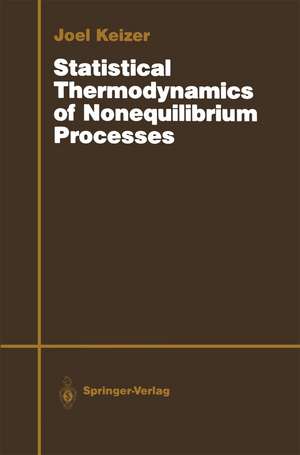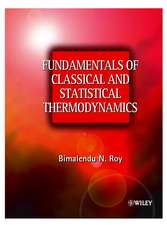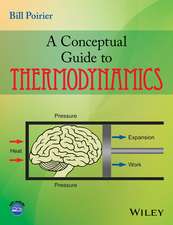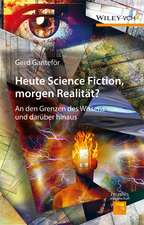Statistical Thermodynamics of Nonequilibrium Processes
Autor Joel Keizeren Limba Engleză Paperback – 20 oct 2012
| Toate formatele și edițiile | Preț | Express |
|---|---|---|
| Paperback (1) | 1227.67 lei 6-8 săpt. | |
| Springer – 20 oct 2012 | 1227.67 lei 6-8 săpt. | |
| Hardback (1) | 1233.83 lei 6-8 săpt. | |
| Springer – 20 iul 1987 | 1233.83 lei 6-8 săpt. |
Preț: 1227.67 lei
Preț vechi: 1497.16 lei
-18% Nou
Puncte Express: 1842
Preț estimativ în valută:
234.92€ • 245.89$ • 195.52£
234.92€ • 245.89$ • 195.52£
Carte tipărită la comandă
Livrare economică 01-15 aprilie
Preluare comenzi: 021 569.72.76
Specificații
ISBN-13: 9781461269984
ISBN-10: 1461269989
Pagini: 524
Ilustrații: XIII, 506 p.
Dimensiuni: 155 x 235 x 28 mm
Greutate: 0.73 kg
Ediția:Softcover reprint of the original 1st ed. 1987
Editura: Springer
Colecția Springer
Locul publicării:New York, NY, United States
ISBN-10: 1461269989
Pagini: 524
Ilustrații: XIII, 506 p.
Dimensiuni: 155 x 235 x 28 mm
Greutate: 0.73 kg
Ediția:Softcover reprint of the original 1st ed. 1987
Editura: Springer
Colecția Springer
Locul publicării:New York, NY, United States
Public țintă
ResearchCuprins
1 Ensembles and Stochastic Processes.- 1.1. The Mechanical Description of Matter.- 1.2. Macroscopic Descriptions and Contractions.- 1.3. Stochastic Processes and Physical Ensembles.- 1.4. Brownian Motion and the Wiener Process.- 1.5. The Langevin Equation and Stochastic Integrals.- 1.6. White Noise.- 1.7. Solution of the Langevin Equation.- 1.8. Ornstein-Uhlenbeck Processes.- References.- 2 Irreversible Processes: The Onsager and Boltzmann Pictures.- 2.1. Introduction.- 2.2. The Linear Laws.- 2.3. Entropy, Dissipation, Fluxes, and Forces.- 2.4. The Hydrodynamic Level of Description.- 2.5. Symmetry of the Two-Time Correlation Function and the Reciprocal Relations.- 2.6. Fluctuations in the Onsager Theory.- 2.7. The Boltzmann Equation.- 2.8. The H-Theorem.- 2.9. µ-Space Averages and the Maxwell Distribution.- 2.10. Conservation Equations.- 2.11. Uniting the Onsager and Boltzmann Pictures.- References.- 3 Elementary Processes and Fluctuations.- 3.1. Introduction.- 3.2. The Stochastic Description of the Boltzmann Equation.- 3.3. The Fluctuating Boltzmann Equation.- 3.4. Elementary Chemical Reactions.- 3.5. The Canonical Form.- 3.6. Stochastic Theory of Chemical Reactions at the Thermodynamic Level of Description.- 3.7. Conservation Conditions and the Progress Variables.- 3.8. Thermodynamics of Chemical Equilibria.- References.- 4 Mechanistic Statistical Theory of Nonequilibrium Thermodynamcis.- 4.1. Introduction.- 4.2. The Canonical Theory.- 4.3. Solution of the Fokker-Planck Equation.- 4.4. Fluctuations and Dissipation.- 4.5. Thermodynamic Properties of the Canonical Theory.- 4.6. Equivalence to the Onsager Theory at Equilibrium.- 4.7. The Master Equation Formulation.- 4.8. Stochastic Diffusion Processes.- References.- 5 Thermodynamic-Level Description of Chemical,Electrochemical, and Ion Transport Mechanisms.- 5.1. Ionic Conduction Noise in Solution.- 5.2. The Feher-Weissman Experiment.- 5.3. The General Linear Mechanism.- 5.4. Bimolecular Isomerization.- 5.5. Continuously Stirred Tank Reactors and Molecule Reservoirs.- 5.6. Electrode Processes.- 5.7. Fluctuations Caused by Electrochemical Reactions.- 5.8. Ion Transport through Biological Membranes.- 5.9. Simulation of Fluctuations.- References.- 6 The Hydrodynamic Level of Description.- 6.1. Diffusion in an Isotropic Medium.- 6.2. Density Fluctuations Caused by Diffusion.- 6.3. Heat Conduction and Thermal Diffusion.- 6.4. Viscous Fluids: The Canonical Form.- 6.5. Fluctuating Hydrodynamics.- 6.6. Chemical Reactions and Diffusion.- 6.7. Quasi-elastic Scattering Theory.- 6.8. Light Scattering in a Thermal Gradient.- 6.9. Local versus Nonlocal Fluctuations.- References.- 7 Nonequilibrium Steady States.- 7.1. Steady-State Ensembles.- 7.2. Stability of Steady States.- 7.3. Fluctuations at Steady States.- 7.4. Multiple Steady States in Chemically Reactive Systems.- 7.5. Critical Points.- 7.6. The Gunn Effect.- References.- 8 Thermodynamics and the Stability of Steady States.- 8.1. The Thermodynamic Stability of Equilibrium.- 8.2. Fluctuations and Stability at Steady States.- 8.3. Thermodynamic Functions at Steady State.- 8.4. Thermodynamic Properties of Steady States.- 8.5. Free Energy and the Electromotive Force.- 8.6. The Nonequilibrium EMF in a Stirred Tank Reactor.- References.- 9 Hierarchies and Contractions of the Description.- 9.1. Introduction.- 9.2. Contractions without Memory.- 9.3. Contraction of Stationary, Gaussian, Markov Processes.- 9.4. Derivation of the Hydrodynamic Level of Description from the Boltzmann Level.- 9.5. Evaluation of Transport Coefficients.- 9.6. RateConstants for Rapid Bimolecular Chemical Reactions.- References.- 10 Nonstationary Processes: Transients, Limit Cycles, and Chaotic Trajectories.- 10.1. Introduction.- 10.2. Nonstationary Systems and Nonlinear Transients.- 10.3. Limit Cycle Oscillations.- 10.4. Fluctuations on Limit Cycles.- 10.5. Chaotic Trajectories.- 10.6. Chaos in Complex Systems.- 10.7. Molecular Fluctuations versus Deterministic Chaos.- References.










